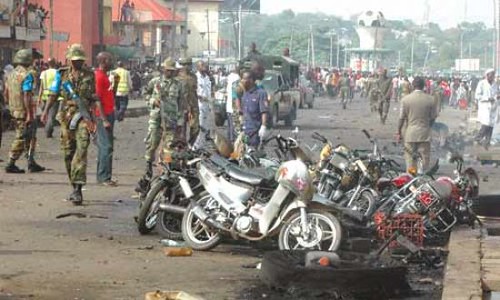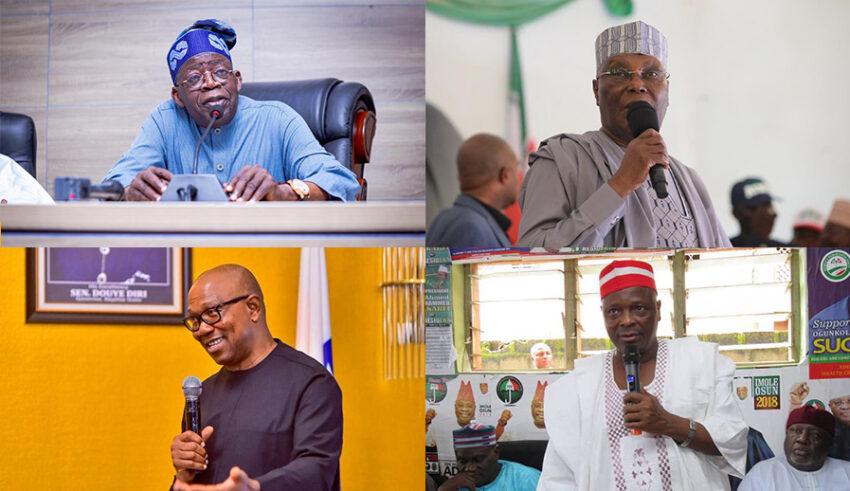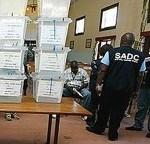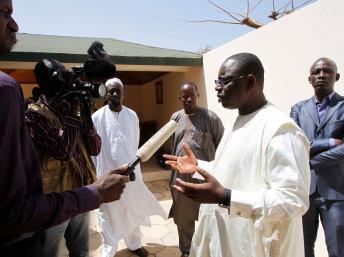Boko Haram and Nigeria’s elections: The candidates’ security pledges

The activities of over 80 active militant groups have already pushed Nigeria to the brink. How will the new president respond?

The main presidential candidates in Nigeria 2023: Bola Tinubu, Atiku Abubakar, Kwankwaso, Peter Obi (clockwise from top left).
Awaiting the winner of the 25 February elections is a raft of challenges, none more consequential than the security crisis whose lethality and extent, especially over the past three years, raised existential questions about the federation. There are currently dozens of armed groups across Nigeria, some of which have the capacity to disrupt the elections at the local and regional levels, clouding the results and triggering the kind of political disputes that could leave the entire electoral process in disarray.
In the northeast where a 14-year insurgency rages, the battle against Boko Haram and the Islamic State in West Africa (ISWAP) will test the limits of the incoming administration – in the same manner it has tested the previous two. The persistence of the Boko Haram insurgency, which began in 2009, suggests the need to rethink Nigeria’s entire counter-insurgency strategy.
Outgoing president Muhammadu Buhari pursued a strategy of escalation: ever more resources were thrown at the police and military in the conflict-affected regions, with ever diminishing returns.
Escalation is one of four possible strategic choices available to warring parties during civil conflict. Other options include continuing current hostilities, seeking allies, and starting formal negotiations.
Will Nigeria’s next president follow a different strategic direction? Below, we examine what counter-insurgency programmes the four leading presidential candidates, have conceived.
The candidates’ positions
Bola Ahmed Tinubu (APC): New directions?
In December 2020, the ruling All Progressive Congress candidate called for a rethink of the government’s security strategy. Recognising the persistence of Boko Haram, he remarked: “In such situations what we do is re-plan our strategy.”
So is a fresh approach in the offing from the ruling party’s candidate? Framing the insurgency as a security problem bred by a socio-economic crisis, Tinubu in his manifesto outlines the need to create new jobs, provide training to young people and make business loans available to stimulate growth. These socio-economic plans will then “be complemented with a complete overhaul of the nation’s existing security architecture”.
In 2013, Tinubu urged the Goodluck Jonathan administration to accept that a solely military response to Boko Haram was “inadequate”.
Our assessment: Tentative, but novel thinking. Tinubu is unlikely to try and escalate the counter-insurgency. Although Tinubu does not discuss entering formal negotiations with Boko Haram, he appears to be the most open to alternative solutions to the conflict.
Atiku Abubakar (PDP): More of the same?
With a manifesto preoccupied with economic recovery, it’s hardly surprising that main opposition People’s Democratic Party (PDP) candidate opens the rather brief chapter on security by focusing on economic growth and employment. Atiku soon reveals his affinity for a security sector-led approach, however: he intends to recruit an additional one million police officers and, while he doesn’t cost it, will also improve the welfare of security personnel. This will be complemented by training and retraining personnel in the latest counter-terrorism practices.
On the campaign trail, Abubakar has told voters that “the lasting solution to the Boko Haram insurgency is strong leadership”.
Our assessment: More of the same. Atiku is likely to pursue a similar approach to Buhari – that of continuing hostilities and possibly military escalation. Many of his security pledges involve increasing resources for the police and military.
Peter Gregory Obi (Labour Party): Thinking outside the box?
In his manifesto, the Labour Party candidate outlines four steps that he would implement to tackle extremism and insurgency. The first is strengthening regional cooperation among Lake Chad Basin states: Cameroon, Chad, Niger, and his native Nigeria. His approach builds on the existing Multinational Joint Taskforce (MNJTF) involving the four West African states. While bedevilled by inconsistent commitment and bumpy cooperation among member states, recent successes against both the ISWAP and more dominant Jamā’at Ahl as-Sunnah lid-Da’wah wa’l-Jihād faction of Boko Haram suggest slow steady progress.
Our assessment: More of the same, with tweaks. Given his roots in the PDP, it is perhaps not surprising that Obi’s security approach has echoes of Atiku’s – increased deployment, more training and equipping of personnel. What is different is his emphasis on regional cooperation, though his reliance on the existing MNJTF is consistent with his conventional approach.
Rabiu Musa Kwankwaso (NNPP): Escalation
The New Nigerian People’s Party (NNPP) candidate and former defence minister has a “special approach”. He plans to expand the Nigerian military by recruiting an additional 750,000 personnel bringing the total to one million in active service with new recruits being largely drawn from Nigeria’s high number of unemployed youths.
While Kwankwaso does address the socio-economic well-being of Nigerians in his manifesto’s security section, the emphasis is on the recruitment of personnel and training of troops. Kwankwaso’s manifesto is the only one of the four that discusses changes to the mandatory one-year National Service and plans to revitalise Nigeria’s defence sector.
Our assessment: More of the same, with tweaks. Kwankwaso’s intention to improve cooperation between the military and private sector is less a bid to strengthen the capabilities of the military than a tacit acknowledgement of the weaknesses of the current system.
The missing piece: Deradicalisation
None of the four manifestos refers to deradicalisation as a key step in improving security in Nigeria, not just in relation to Boko Haram and other Islamist groups like ISWAP but in the context of other anti-state movements such as the insurgency in the Niger Delta which began in 2005.
The reluctance to discuss deradicalisation is likely the result of the lack of trust between local communities and reformed Boko Haram fighters. In 2016, the Buhari administration launched “Operation Safe Corridor”, a DRR programme (i.e. Deradicalise, Rehabilitate and Re-integrate) that has seen more than 1,000 former jihadists successfully graduate . Despite this, the International Crisis Group reports that the programme has been plagued by numerous issues including low levels of public support, overcrowding and poor conditions at detention centres.
Research carried out by Tarela Juliet Ike, a Lecturer in Criminology and Policing at Teesside University, shows that there is significant distrust in the deradicalisation process in local communities. This was due to the perception that the Nigerian government has not provided enough resources to the deradicalisation and rehabilitation stages of the programme which had led to further questions about the effectiveness of the criminal justice system in Nigeria more generally. Questions over the legitimacy of the state are not unique to the Boko Haram insurgency; they are a recurrent theme in the Niger Delta as well as with separatist movements elsewhere, notably the Indigenous People of Biafra (IPOB) in the South-east, and the Oduduwa irredentists in the Southwest.
In December 2022, the outgoing Buhari government announced plans for two new rehabilitation centres with funding of US$5.2 million. The new administration should maintain these plans. Improving the conditions of detention centres as well as expanding the availability of essential psychotherapy services for those undergoing deradicalisation will challenge perceptions that DRR programmes are too under-resourced to make a lasting positive impact. Rehabilitation centres, when given the right level of investment and resources, can be successful in supporting the deradicalisation process as seen in the case of the Serendi Rehabilitation Centre in Mogadishu, which has supported former al-Shabaab militants in their transition back into Somali society.
Forgive but never forget: time for a TRC?
As well as demonstrating that adequate resources have been channelled into the deradicalisation and rehabilitation process, the final part of the programme, reintegration, will require fresh ideas to bring about greater coordination and input from local communities to help foster trust.
One possible solution could be the formation of a Truth and Reconciliation Commission (TRC) as a form of restorative justice. A TRC would provide a safe forum for local communities to hear former insurgents take accountability for their role in Boko Haram’s destructive attacks. This would tackle the problem of indifference shown by local communities towards repenting ex-jihadists – an issue identified by Tarela Juliet Ike. Reconciliation through an appropriate and recognised body like the TRC would provide local communities with a sense of restorative justice that is needed for reintegration to be successful.
Beyond Boko Haram
A successful DRR programme in Nigeria’s northeast could lay the foundation for similar programmes being implemented in other parts of the country where security challenges also persist. In 2019, the Niger Delta saw an increase in insecurity in a region where militants regularly target critical infrastructure for the oil and gas sector.
Context is important, however. While some lessons from a Boko Haram DRR programme may be applied in the Niger Delta or in other cases of violent extremism, each programme needs to be adequately adapted to its own context. There simply cannot be a one-size-fits-all approach towards the complex process of deradicalisation, rehabilitation, and reintegration.





